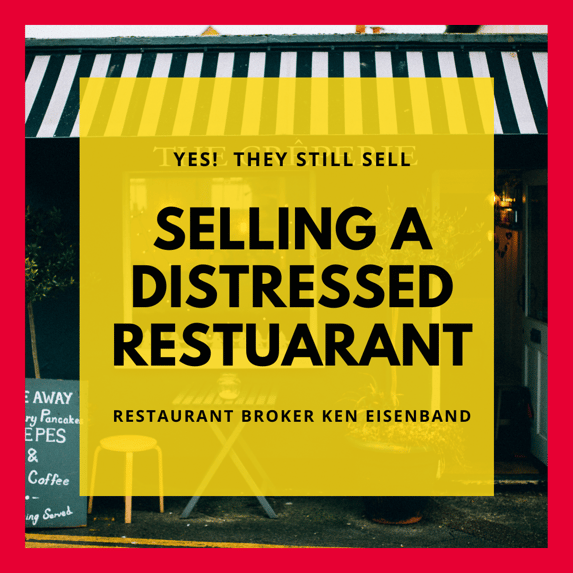Owners contact restaurant brokers when they want to sell their restaurants. This article discusses a distress sale and how a restaurant owner handles it.
 The reasons people contact restaurant brokers to sell their restaurant include retirement, health, divorce, burn-out, other business goals, and of course distress. Just what is a restaurant in distress? A restaurant in distress might not be losing money. It is however not making enough money for the owner to survive. The restaurant owner has to pay all of the bills in the restaurant, but also has to pay the mortgage and rent for his/her home, car, insurance, utilities, and support his/her family. This restaurant owner is under a lot of stress. You can see it when you enter the establishment. Employees feel it every day at work. This feeling is passed along to the customers. Repairs and maintenance on equipment aren’t made. Renovations and upkeep on the facilities do not happen. The restaurant starts running out of food. Lower quality food items are used as substitutes. Staffing levels are cut. The owner starts working seven days a week. Why is this happening? The owner is juggling which bills are going to be paid. Do I pay my mortgage at home or do I pay the rent for the restaurant? Do I pay the food supplier to do I go to Publix for my family? The stress level is building and the restaurant owner wants out. He contacts a restaurant broker and says he wants to sell.
The reasons people contact restaurant brokers to sell their restaurant include retirement, health, divorce, burn-out, other business goals, and of course distress. Just what is a restaurant in distress? A restaurant in distress might not be losing money. It is however not making enough money for the owner to survive. The restaurant owner has to pay all of the bills in the restaurant, but also has to pay the mortgage and rent for his/her home, car, insurance, utilities, and support his/her family. This restaurant owner is under a lot of stress. You can see it when you enter the establishment. Employees feel it every day at work. This feeling is passed along to the customers. Repairs and maintenance on equipment aren’t made. Renovations and upkeep on the facilities do not happen. The restaurant starts running out of food. Lower quality food items are used as substitutes. Staffing levels are cut. The owner starts working seven days a week. Why is this happening? The owner is juggling which bills are going to be paid. Do I pay my mortgage at home or do I pay the rent for the restaurant? Do I pay the food supplier to do I go to Publix for my family? The stress level is building and the restaurant owner wants out. He contacts a restaurant broker and says he wants to sell.
This is when the first of many mistakes occurs. The restaurant owner does not want to admit failure to the broker so he says the restaurant is great and making money, but he/she wants to sell because of burn-out or other business opportunities. The restaurant broker says they can help sell the restaurant.
As a restaurant broker we are selling one of two things. The assets of the business or a paycheck for the new owner. If we are selling the assets of the restaurant you can expect 10 – 20 cents on the dollar of what you spent. If we are selling a paycheck you can expect a multiple of those earnings (or owner benefit) in the selling price. This is when the valuation gets tricky. The restaurant broker will ask for current profit and loss statement in order to an evaluation. In a perfect world the owner would print them up and go over the statement with the broker and indicate what expenses would go away once the new owner takes over. These expenses include owner’s salary and taxes associated with salary, cell phone bills, personal insurance, car bills, loan payments and interest, depreciation, etc. These expenses are referred to as add-backs. Now, the second mistake. The distressed owner indicates that not all sales are accounted for and that he takes $75,000 out the business in cash each year. He doesn’t tell you that out of the $75,000, $65,000 goes to pay employees under the table. In essence, the owner wants to sell the restaurant based on the numbers reported to the IRS plus the cash he has stolen from the business, and then not report all expenses. The owner will then make this statement, “Everyone does it, and anyone seriously looking to buy a restaurant should realize that.” Then the distressed owner will say “I need to get at least what I put into the place.” The restaurant broker asks why and uses this analogy. If you invested $200,000 to buy a stock and the stock price drops to $100,000, can you say I just want what I purchased it for? Unfortunately, assets are sold at 10 to 20 cents on the dollar and if you cannot prove earnings you do not have earnings.
Now, the third mistake. The distressed restaurant owner says he will list, but only at his price. The inexperienced restaurant broker relents and lists at a price he knows is too high. As weeks and months go by the distressed owner blames the restaurant broker for lack of activity. The sales are dropping, bills are piling up and the distressed owner goes deeper in debt.
Finally the fourth, and final mistake is made. The distressed restaurant owner calls the restaurant broker and asks to list the property as an asset sale. Even then the owner wants more than he can hope for. It sits on the market for an additional month or two and the owner goes deeper in debt. The landlord is now threatening to evict and since the restaurant owner has signed a personal guarantee on the lease the landlord is threatening to sue the owner, not the restaurant. The distressed owner calls the restaurant broker and says “just get me anything; I need to get out of this lease.” The broker sets a price that might attract a buyer. Unfortunately, you only get one chance to make a first impression and many buyers will not look at the restaurant no matter the price. However, your broker manages to find some possible buyers and has them go over to look at your restaurant. To the surprise of the buyers and the broker you have closed up your restaurant. You needed to support your family. The bills became too great, you declared bankruptcy to keep the landlord off your back, and you took a job that paid you enough money to support your family.
This scenario could have been avoided. The distressed restaurant owner needs to be honest with themselves and their restaurant broker. A restaurant priced correctly takes an average of nine months to sell in this economy. If you know you cannot last nine months, you need to price your restaurant aggressively. You might lose money on the transaction, but you will have receive some money, save your credit score, reduce your stress immediately, and be able to start your life with a clean slate. To sum up how to sell a distressed restaurant. Be honest with yourself, your restaurant broker, and the potential buyer.
Like this article? Please SHARE it on Facebook, Linked In, and Instagram!
 Ken Eisenband, Certified Restaurant Broker®, CBI leads two offices for We Sell Restaurants in Broward and Palm Beach Counties in Florida with distinction and directs a team of Restaurant Brokers as a multi-unit owner. He is a member of the Business Brokers of Florida (BBF), where for multiple years, he has received the prestigious Dealmaker Award. Ken is licensed by the Florida Real Estate Commission as a broker and is an associate of the Boca Raton Chamber of Commerce and the Restaurant Vendors Association. Previously, Ken was a multi-unit supervisor for Ruby Tuesday’s, overseeing the opening of 25+ units, and has owned two independent restaurants, one of which was voted Best of Palm Beach County in 2009 by the readers of the Sun Sentinel.
Ken Eisenband, Certified Restaurant Broker®, CBI leads two offices for We Sell Restaurants in Broward and Palm Beach Counties in Florida with distinction and directs a team of Restaurant Brokers as a multi-unit owner. He is a member of the Business Brokers of Florida (BBF), where for multiple years, he has received the prestigious Dealmaker Award. Ken is licensed by the Florida Real Estate Commission as a broker and is an associate of the Boca Raton Chamber of Commerce and the Restaurant Vendors Association. Previously, Ken was a multi-unit supervisor for Ruby Tuesday’s, overseeing the opening of 25+ units, and has owned two independent restaurants, one of which was voted Best of Palm Beach County in 2009 by the readers of the Sun Sentinel.

 404-800-6700
404-800-6700.png)











